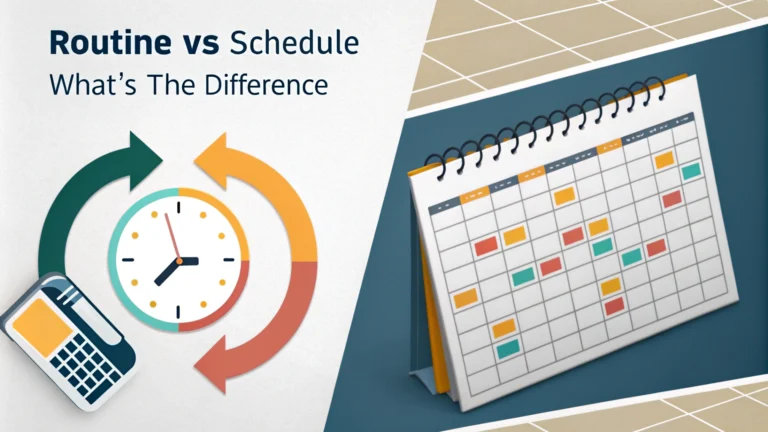The terms **routine** and **schedule** often get mixed up, yet knowing the difference helps create better structure in daily life. A **schedule** focuses on specific times for activities, while a **routine** consists of regular patterns and sequences.
Learning to distinguish between these organizational tools unlocks better time management and personal productivity. This quick guide explores the key differences and shows how to use both effectively.
Key Differences Between Routines and Schedules
- **Schedules** are time-bound and specific
- **Routines** focus on sequence and habit formation
- Schedules require external timepieces
- Routines rely on internal patterns and cues
Benefits of Following a Schedule
- Clear time allocation for tasks
- Improved punctuality and meeting deadlines
- Better coordination with others
- Enhanced time awareness
Advantages of Establishing Routines
| Benefit | Impact |
|---|---|
| Reduced Decision Fatigue | Less mental energy spent on daily choices |
| Habit Formation | Automatic behavior patterns develop |
| Flexibility | Adaptable to different time constraints |
Simplifying Daily Scheduling with Effective Tools
Having the right tools and methods can transform how you handle daily planning. This quick guide shows how to combine both **schedules** and **routines** to create better structure while maintaining flexibility.
Creating Smart Schedules That Work
- Use **time blocking** for focused work sessions
- Include **buffer zones** between tasks
- Set specific start and end times
- Align schedules with your peak energy hours
Building Lasting Daily Routines
Start with small, manageable routines that naturally flow together. Focus on **habit stacking** – linking new habits to existing behaviors.
| Time of Day | Routine Example |
|---|---|
| Morning | Make bed → Shower → Coffee |
| Evening | Clear desk → Review tomorrow → Set alarm |
Tools for Better Time Management
- **Digital calendars** with reminders
- **Time-tracking apps** for productivity analysis
- **Paper planners** for visual organization
- **Task management software** for project planning
Common Scheduling Mistakes to Fix
Many people **overload** their schedules or create unrealistic timeframes. Leave room for unexpected events and regular breaks.
“The key is not to prioritize what’s on your schedule, but to schedule your priorities.”
Adjusting Plans When Life Changes
- Review and update schedules weekly
- Keep core routines simple and portable
- Build in flexibility for unexpected events
- Focus on priority tasks first
Tracking Progress and Making Improvements
Use a **progress journal** or app to monitor how well your routines and schedules work. Make small adjustments based on what you learn.
Taking Action and Moving Forward
Start by choosing one area to improve – either a morning routine or work schedule. Small changes compound into significant improvements over time.
| Action Step | Timeline |
|---|---|
| Identify current patterns | Week 1 |
| Test new routine/schedule | Weeks 2-3 |
| Evaluate and adjust | Week 4 |
Routine vs Schedule FAQs
Q: What’s the main difference between a routine and a schedule?
A: A routine is a regular sequence of actions you follow, while a schedule is a time-based plan with specific time slots for activities. Routines are more flexible and habit-based, whereas schedules are more rigid and time-dependent.
Q: Can you have a morning routine without a schedule?
A: Yes. A morning routine focuses on the sequence of activities (like brush teeth, shower, breakfast) rather than specific times. You can perform these actions in order without adhering to strict timing.
Q: Which is better for productivity – routines or schedules?
A: Both serve different purposes:
- Routines build consistent habits and reduce decision fatigue
- Schedules help manage time-sensitive tasks and deadlines
The most effective approach often combines both.
Q: How do routines help with habit formation?
A: Routines support habit formation by:
- Creating predictable patterns
- Reducing mental resistance
- Building automatic behaviors
- Establishing triggers for actions
Q: Why do some people struggle with rigid schedules?
A: People may struggle with rigid schedules due to:
- Natural variations in daily energy levels
- Unexpected interruptions
- Different personality types
- Stress from time pressure
Q: How can parents create effective after-school routines?
A: After-school routines should include:
- Designated homework time
- Snack breaks
- Physical activity
- Consistent dinner time
- Regular bedtime preparation
Q: What’s the difference between a bedtime routine and a bedtime schedule?
A: A bedtime routine involves consistent activities preparing for sleep (like washing face, reading), while a bedtime schedule specifies exact times for these activities (9:00 PM bath, 9:30 PM reading).
Q: Can routines improve work-life balance?
A: Yes, work-life balance routines can help by:
- Creating boundaries between work and personal time
- Establishing consistent family time
- Ensuring regular breaks
- Managing energy levels throughout the day
Q: How often should you revise your daily schedule?
A: Review and adjust your daily schedule when:
- Life circumstances change
- Current schedule isn’t working
- Seasonal changes affect your routine
- Every 3-6 months for general maintenance
Q: What’s the best way to transition from routines to schedules?
A: To transition from routines to schedules:
- Start by timing your existing routine activities
- Gradually add time blocks
- Keep some flexibility
- Use buffer times between activities



















